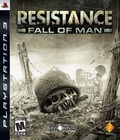With one million PlayStation 3 systems shipped since mid-November, Sony is claiming a minor victory in the next-generation console war, as the PlayStation 3 hit the million mark at a faster rate than its main rival, the Xbox 360. Whether this will ultimately equate to long-term success is unknown, but for the time being, Sony has some post-holiday boasting rights.
While I am (sadly) aware that a large percentage of the consoles sold to date were purchased solely for the purpose of resale, I still have to doubt that the system would be as hyped up as it has been without Resistance: Fall of Man. It may not have developed the fevered following of Gears of War, but sans Resistance, the PlayStation 3 would have even less going for it than it already does. After all, in such an alternate universe, Ridge Racer 7 would be the best original launch title — and that game is only marginally original as it is.
The originality of Resistance has come under question as well, but for entirely different reasons. At times, the game recalls the statuesque first-person shooters of recent years: Half-Life 2, Halo, and even Call of Duty. Though Resistance: Fall of Man starts off feeling a bit familiar, it ultimately puts all the pieces together, feeling much more like a fully realized concept than a sub-par mash-up.
Resistance: Fall of Man does its own dabbling in alternate universes, painting a world in which the Great Depression and World War II never happened. It is 1951, and the biggest conflict facing the world is not the Korean War — it's the rise of the Chimera, a bizarre race of (presumably) alien creatures that have taken over Europe and threaten to claim Earth as their own. The dozen-plus Chimera types include Hybrids (six-eyed bipedal grunts), Widowmakers (monstrous spider-like beasts), and Grey Jacks (tall, lanky, wrinkled guys with very long arms).
As Sgt. Nathan Hale, a United States Army Ranger, you will battle through 30 missions (spread over three days in July) in an attempt to reclaim Europe from the Chimera and make a final stand. Here's the slight twist: Hale may actually be infected with the Chimeran virus, as he is the only human to ever survive a Chimeran Spire attack. However, he maintains his human form and consciousness, so it remains only speculation, despite some less-than-subtle changes. Resistance uses a unique narrative viewpoint, telling the story in past-tense through the eyes of Captain Rachel Parker, a British soldier who features only moderately in the actual storyline. Hale never speaks, so he remains largely a blank slate throughout the course of the narrative.
Resistance starts off in the war-torn streets of Europe, and at first, some might think it to be a new entry in the Call of Duty series, albeit with smoother visuals. Of course, the large four-eyed beasts with the Bullseyes (laser guns) signal a slight change in direction. Still, many of the early levels use the sort of crumbled, bombed-out cityscapes that have populated World War II titles for years. As the game progresses, such settings are swapped for industrial buildings, underground military bunkers, subway stations, and epic, futuristic towers. The environmental variety keeps things interesting, and the tight hallways found in many of the settings should keep you on your toes — there might be a horde of Hybrids around the next turn.
But in actuality, it's the vast battlefields that really impress. Resistance often puts you in the middle of a massive battle, and there's no going back; you must discover the best path to success and get through the conflict without biting the big one. While I certainly expect and appreciate the challenge included with navigating an extensive battlefield, Resistance as a whole suffers from a lack of suitable checkpoints. Far too often, you will be forced through a string of difficult encounters without a break or a checkpoint, leading to a lot of time lost when you don't make it through. As such, you must play carefully and keep a mental map of health and ammunition pickups that you passed up. It is much easier to spend two minutes backtracking than to lose several minutes redoing a segment of a level.
What makes the single-player mode in Resistance: Fall of Man so thrilling is the sheer intensity of it all. Though not an intentionally frightening game, there were more than a few occasions in which I was unexpectedly greeted by a flock of Chimera — and it freaked me out! In the 13th mission, you must take down a group of Grey Jacks, who are tall, lanky, and have really off-putting animations. Resistance finds a middle ground between intense and creepy similar to that of 2005's Resident Evil 4. With 30 missions and enemy A.I. that never lets up, you can expect to spend a solid 15 hours taking back Europe from the Chimeran forces.
Insomniac Games are best known for their Ratchet & Clank series of action/platformers, which has always been praised for its unique weaponry. Such tongue-in-cheek subtitles as Going Commando and Up Your Arsenal further attest to Insomniac's eye for assault techniques. Resistance: Fall of Man is no different. While some genre mainstays made the cut, their secondary functions often set them far apart from the weapons in your average first-person shooter. For example, the Bullseye rapid-fire laser weapon may not be staggeringly unique on the surface, but its alternate fire (via the L1 button) allows you to shoot a tag into any enemy. Once a tag is placed, you can fire in any direction and have your shots automatically redirect toward the target.
Among the more unique firearms is the Sapper, which fires off a series of blob-like mines that can be set off manually with the alternate fire button. The Auger is one of the more powerful weapons in the game, as it fires a series of yellow bursts that can travel through several walls and structures. The significant downside is that the Steelhead enemies also wield the Auger and will not hesitate to tear you to shreds, regardless of the box or pillar you may think that you are safely hiding behind. Though Resistance provides a significant arsenal of firearms and grenades to choose from, completing the game on any difficulty unlocks several additional weapons, making a second play-through much more appealing.
Even the vehicle segments in Resistance are enjoyable, be it via the L-UP LYNX off-road vehicle (Warthog, anyone?) or a hijacked Chimeran Stalker. All of this is made possible via a smart control scheme that places a lot of emphasis on the shoulder buttons. The R1 and L1 buttons are used for firing, while L2 initiates crouching and R2 handles weapon management. A quick click will swap to the next firearm, while holding it down will halt the gameplay and quickly display a simple and friendly visual list of your available weapons. The face buttons are used for grenades, reloading, jumping, and using buttons and vehicles, while the motion controls are mainly used for fighting off enemy attackers or shaking off tags in multiplayer.
Resistance: Fall of Man may not have the visual chops of Gears of War, but what it does have is consistency; everything looks good all the time, without a hint of slowdown. The A.I. characters are very well animated, looking more like they came out of a platformer than a standard first-person shooter. The environments may not be hyper-detailed, but they are vast and packed — rubble fills the streets, and tousled desks and papers can be found in offices. I would have liked to have seen a bit less repetition in the Hybrid enemy models, but otherwise, everything seems well-designed and well-executed.
Even if you bought Resistance for the single-player experience, do not pass on the expertly crafted online multiplayer. While the game sadly lacks online co-op play (unlike Gears of War), it does feature six multiplayer game types, around which a robust online community has developed. Deathmatch, Team Deathmatch and Capture the Flag may all sound familiar, but Meltdown finds you capturing and defending coolant nodes, while Breach tasks you with entering your opponents' base and destroying their reactor. In the Conversion game type, everyone starts off as a human, but a single kill will turn you into a Chimeran Hybrid. Die again, and you're done — the last man standing (either human or Hybrid) is the winner.
What strikes me most about the multiplayer is how incredibly smooth it is. Even with 40 players, the framerate never dips below the fixed 30fps, and I have yet to experience any lag. Each game type can be heavily customized, and Resistance uses a unique point system that rewards you both for kills and for assisting with a kill. On top of receiving 10 points for a kill, you can also earn two points for helping with someone else's kill. Not only does it give you another way to win the match, but it eases the sting typically felt when someone else swoops in and steals your kill. With numerous awards and a ranking system, Resistance offers up one of the most enjoyable and fully featured online experiences in the genre.
 Despite my very positive experience with Resistance: Fall of Man, I would stop just short of calling it a system seller. Few games in history could sell a $600 console on their own, and Resistance ultimately is not the kind of impact title that could do it. Still, Resistance is an excellent, refined first-person shooter that would be among the best titles on any console in any year. Between the memorable single-player mode and the silky-smooth online play, Resistance provides an experience that, while occasionally familiar, is always worthwhile. If you already took the plunge on a PlayStation 3, skip the numerous also-rans and join this Resistance A.S.A.P.
Despite my very positive experience with Resistance: Fall of Man, I would stop just short of calling it a system seller. Few games in history could sell a $600 console on their own, and Resistance ultimately is not the kind of impact title that could do it. Still, Resistance is an excellent, refined first-person shooter that would be among the best titles on any console in any year. Between the memorable single-player mode and the silky-smooth online play, Resistance provides an experience that, while occasionally familiar, is always worthwhile. If you already took the plunge on a PlayStation 3, skip the numerous also-rans and join this Resistance A.S.A.P.
Score: 9.1/10
More articles about Resistance: Fall of Man











 In Resistance: Fall of Man, the U.S. and Britain band together in a last-ditch effort to save Europe and Asia from a horrific scourge. In mere decades, the Chimera a species of unknown origin propagating a virus that converts other life forms into more Chimera has overrun Russia and all of Europe. Humanitys hope for survival is slim, and the tide of the battle rests on the shoulders of U.S. Army Ranger, Sgt. Nathan Hale.
In Resistance: Fall of Man, the U.S. and Britain band together in a last-ditch effort to save Europe and Asia from a horrific scourge. In mere decades, the Chimera a species of unknown origin propagating a virus that converts other life forms into more Chimera has overrun Russia and all of Europe. Humanitys hope for survival is slim, and the tide of the battle rests on the shoulders of U.S. Army Ranger, Sgt. Nathan Hale.










































